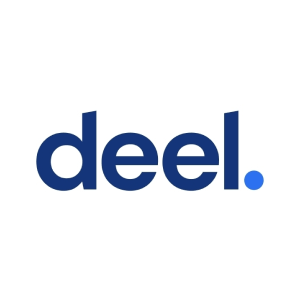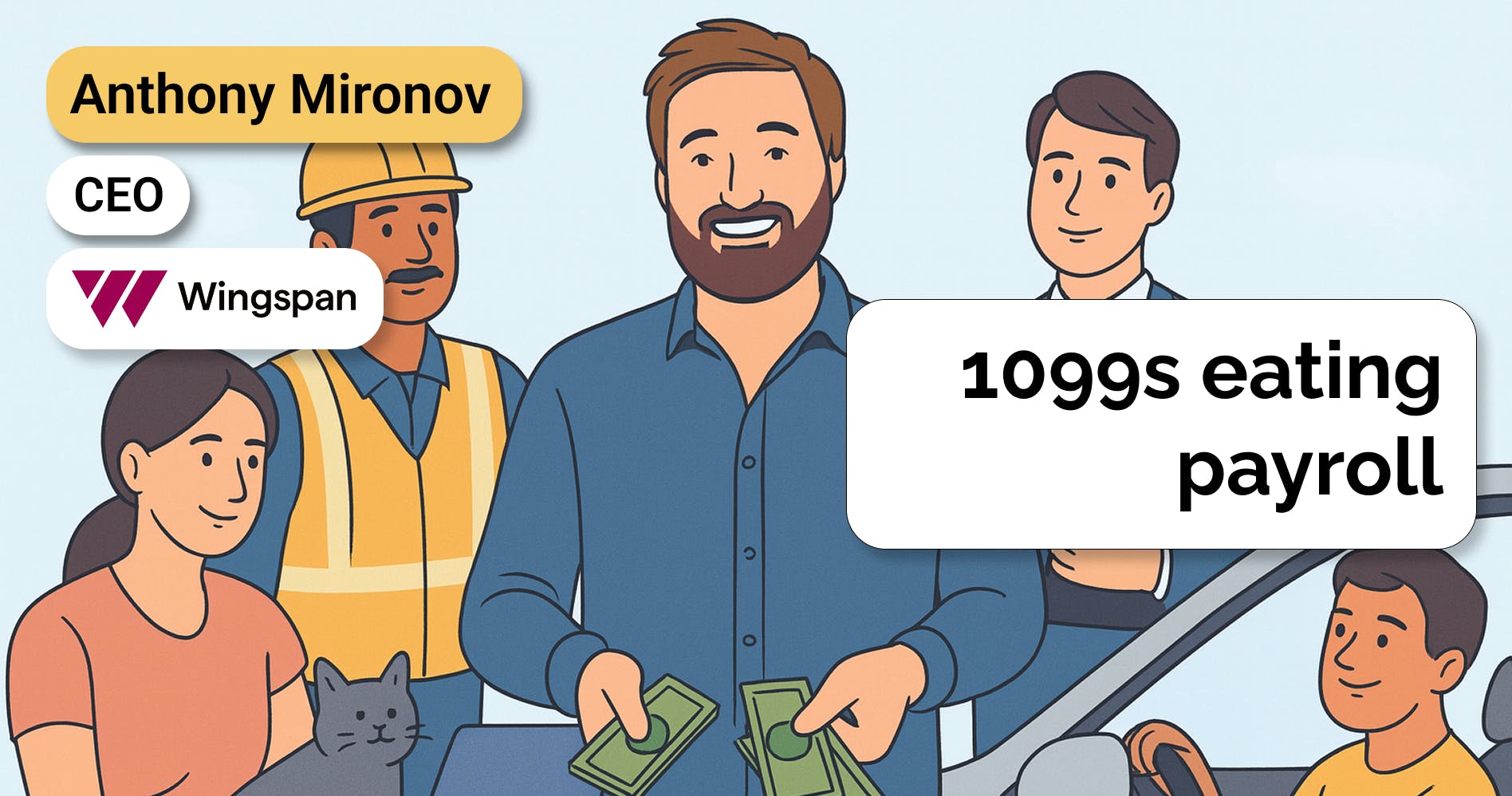Dan Westgarth, COO of Deel, on the global payroll opportunity
 Jan-Erik Asplund
Jan-Erik Asplund

Background
Dan Westgarth is the Chief Operating Officer at global payroll company Deel. Before Deel, he worked at Revolut and launched it in the United States. We talked to Dan to get a better understanding of how global payroll companies like Deel monetize, Deel's customer mix, and the state of the competitive dynamics between startups like Deel, Remote, Papaya and Panther, incumbents like ADP and Paychex, and more mature payroll startups like Gusto and Rippling.
Questions
- Could you talk about your role at Deel and how it's evolved over time?
- Could you talk about what businesses did before Deel when they were paying international team members? What was the secret that Deel was able to exploit or capitalize on?
- Can you walk through how Deel monetizes?
- What does the customer profile roughly look like, between startups hiring contractors and bigger companies establishing presence around the world? Has the motion mainly been bottom-up product led growth?
- A lot of companies use both Deel for international payments and then something like Gusto or Justworks for domestic. Is the Deel vision one unified payroll for all employees, or does it look more like a bunch of best in class point solutions for different things? Are you seeing folks using Deel to pay domestically?
- On the consumer side, it seems like what companies ultimately want to do is deliver benefits to end users to make sure that they bring their business to the next company they work with and increase stickiness. How are you thinking about these sorts of consumer services and their purpose? And are you seeing signs that contractors going from job to job are acting as a source of referral?
- Do you have a take on why other companies haven't launched many employee-facing products? In addition to Deel Card and Deel Advance, how do you think about launching more products or other kinds of services?
- What do you think is different about the Deel team that has led to a focus on product quality or product experience that makes it not just another back-office HR tool? What does Deel do from a culture perspective?
- Do you feel like Deel does anything differently from other companies about the way you work and communicate remotely that's made you successful?
- How do you think about Deel's positioning within this landscape of other employer of record services, and also TransferWise, Revolut, etc.? Where do you see Deel within that landscape and why do employers choose it?
Interview
Could you talk about your role at Deel and how it's evolved over time?
Dan: My first company was Revolut. I joined them straight out of school and did pretty well there. I launched Revolut in the US. Then I set up a little investment syndicate, and we invested in 25 different companies. I advised some of them. I met the Deel founders through a famous investor Oliver Samwer, and I got on really well with them, and they offered me the position of COO. I came on board around 10 to 15 people; we're now 400. We help companies hire anyone anywhere.
We're going to take this company all the way: we're going to build something really big, and I'm pumped.
Could you talk about what businesses did before Deel when they were paying international team members? What was the secret that Deel was able to exploit or capitalize on?
Dan: First of all, there are two different models. I think startups and companies that are bootstrapping would find talent overseas, and they would effectively agree to some terms -- probably on a contract that the founders had drafted themselves -- and then wire them $5,000 a month. Just an international wire. They would hope that that individual or the tax authorities wouldn't cause them any problems. That's the reality of it.
On the flip side, you have more established companies that need to hire and build their presence overseas. What they would typically do is: they would say to their corporate law firm, "Hey, we want to incorporate in Canada, we want to incorporate in Mexico. We're going to send a general manager or some executive over there. We're going to put them in an Airbnb or a hotel for three months. We're going to move them onto that payroll, and they're going to live there for two years." Then with that, they would set up an office, they would make the hires, and they would build what I call a "material presence" in the country.
What Deel has done is to solve those two cases with technology, as well as all of the cases in between. We do that through a technology platform that marries fintech and HR tech together. When it comes to paying a contractor overseas, which was the first use case I mentioned, we have a legal framework to ensure that that production is legal, that the relevant tax authority registrations are made, and that no one is going to cause problems. Then we have the fintech that delivers the funds between the two parties. The other use case that I mentioned -- we are actually doing that story. We're sending the general manager to the country, we're setting up in the country, we're establishing a presence and all of that. Then we're able to hire a person on your behalf.
Can you walk through how Deel monetizes?
Dan: In broad strokes, so you'll see we charge $50 a month for the independent contractor model. What are you paying for there? You're paying for access to top tier legal counsel.
For the employer of record model, what we do is assume liability. We're not only set up in that country, but we actually take liability too. We charge $500 for it. These are our two main monetization levers.
Exchange rates are a zero sum game for us. If you think about the business, it's pretty complex. We're essentially handling contracts in many different currencies, many different countries, so the operation of hedging all of the currencies is not cheap, it's very expensive. So it nets to be zero.
What does the customer profile roughly look like, between startups hiring contractors and bigger companies establishing presence around the world? Has the motion mainly been bottom-up product led growth?
Dan: Earlier on when we were kind of post-product market fit, we saw pretty interesting cases. We had startups coming to us who wanted to hire very, very quickly. We had some big companies come to us that wanted to check us out. Since then, we just see everything and anything. Some of the biggest companies in the world are currently in the diligence stage with us, but then we still have the scrappy startups, which have got the pre-seed or micro seed and haven't even finished the company incorporation. Like, "Hey, how do I fill out your KYC form?" So like, "Well, you need to incorporate first, buddy." We see a whole range.
And I don't think that's entirely true that the motion has mainly been bottom-up, product led growth. I think that the founders have really acted as sales people in some respect. They've also really driven this. I think they've found problems that Deel solves and they've approached those clients.
A lot of companies use both Deel for international payments and then something like Gusto or Justworks for domestic. Is the Deel vision one unified payroll for all employees, or does it look more like a bunch of best in class point solutions for different things? Are you seeing folks using Deel to pay domestically?
Dan: If I look at the lifecycle of the platform, initially we used to say, "No, if you want a domestic payroll solution, head over to Gusto or Rippling, or something local in your country, because they're more experienced."
Our stance on that is changing, for two reasons. One is that our domestic plays are really strong now. Two, just speaking from experience, consolidation of platforms is so powerful. Having to run payroll over multiple platforms is a pain in the ass. Now our selling position is, "You can use us for domestic too. Deel is awesome -- one quick payroll for all of your team around the world." I use Deel myself for our team, and we have 350 people in over 50 countries. It's just one click to pay them all.
As far as domestic, that's another product coming. Typically if you're paying domestically, you want to pay from your own entity, unless you're using a PEO or an EOR. We're just supporting this "bring your own entity" flow right now. Once that's live, we'll see more people paying full time employees domestically.
On the consumer side, it seems like what companies ultimately want to do is deliver benefits to end users to make sure that they bring their business to the next company they work with and increase stickiness. How are you thinking about these sorts of consumer services and their purpose? And are you seeing signs that contractors going from job to job are acting as a source of referral?
Dan: I think for the stage of the organization we're in, we're just laser focused on acquisition and growth. The retention and expansion have actually been natural. In the company manifesto and principles, the number two principle we have at Deel is "care." That extends to our own team and to our customers. Care creates retention: really care about the customer and go that extra mile on every single communication, that creates retention naturally. It's a little bit different from a B2C business. I think it's only relevant in B2B, but you really have to go the extra mile to care.
I think later on we will put more effort into retention, expansion and activation, but today it hasn't been a key problem. We've had a really good inbound funnel and seen this happen naturally, with very low churn rates.
And I've seen it quite a few times. I love those cases. When I see a case pop up where the customer has taken us to the next employer, I love it.
Do you have a take on why other companies haven't launched many employee-facing products? In addition to Deel Card and Deel Advance, how do you think about launching more products or other kinds of services?
Dan: The way I look at this is, the truly global platforms will always appeal to businesses with global needs. I travel a lot, and that always means I default to Uber over Lyft, even when in the States, because I have international needs.
I think that Deel will always prevail for any company which has international presence. If you take a look at domestic companies and national companies or multinational companies, and then compare Deel versus, say, Gusto's wallet product, I think you would see some guys go to Gusto, but I don't think we care too much. I think our market's big enough to win all of that international business and some of the domestic business and operate in a hundred plus countries. I don't think we're too upset.
We will undoubtedly launch more products, but I think you have to remember the stage of business we're at right now. We're a growth company, so it's all about operational scaling and making sure that we have the right processes in place to take Deel to hundreds or thousands of millions of people. Typically what I've seen in my experience with Deel and with my former companies is that, during this high growth stage, there's less R&D done and less new product development, and it's more about creating efficiency and optimizing existing products.
What do you think is different about the Deel team that has led to a focus on product quality or product experience that makes it not just another back-office HR tool? What does Deel do from a culture perspective?
Dan: I think there are two disparate things. The reason that Deel has a product focus and is not seen as back office is because of the way that the product chief has designed the business, and that's the CEO right now.
Then separately, one of the reasons we're able to execute on the vision of the product chief is because the team is really, really happy. You don't often hear this. You hear people say, "My team works really, really hard. My team's really, really smart." But you don't often see a team that's really, really happy. If you hire really smart hardworking people and then make them feel really happy and valued, that's what gets the engine going.
I think it's respect. Respect can be often lost in the workplace or can often become somewhat artificial. For lack of a better term, keeping it real. Just treating people how you want to be treated yourself. Don't bring a different face to work. It's so easy to do with remote. One of the reasons I didn't like working in corporate is because people would put on a different hat: they literally put on their suit and turn into a different person. I think in a traditional startup, when you're in an office, that's diluted significantly, to maybe 5%, but it still happens a little bit. I think with remote work we've probably diluted it to 99%. Everyone is really, really real and having a really good time and really authentic. That creates respect and that creates happiness.
To be really tangible about it, the exec/founder team interviewed and hired every single person up to about 300 people. Alex, Shuo and I interviewed most people; collectively, we interviewed all of them. Just that final filter on culture. We turned down a lot of very good on paper candidates: very good, smart guys that on paper were flawless and were willing to take big pay cuts in exchange for startup salary and equity. We turned them down because they didn't tick that culture box. I think just never compromising on that is really important.
Do you feel like Deel does anything differently from other companies about the way you work and communicate remotely that's made you successful?
Dan: I think so. It's all rooted in respect, like not expecting someone to take a call at 6:00am and not expecting someone to do some horrible task that is meaningless.
I think that we've also done a good job of clustering teams. Most of our fintech team is either in the Americas or Western Europe, like London to the Americas. For the R&D team we have Ukraine, Israel, the Americas. We've always designed this business with a global footprint. It becomes problematic where you have outliers. If you have 80% of your team in the US, but 20% in Europe, that can become tough. If you try and keep it evenly distributed, that's much more powerful.
Another tip I would say is trying to reduce the number of calls.
How do you think about Deel's positioning within this landscape of other employer of record services, and also TransferWise, Revolut, etc.? Where do you see Deel within that landscape and why do employers choose it?
Dan: I think the other employer of record services are going to get left behind. They're not internet-first businesses. I think that's really important. It's really typical for the internet-first players to win. It's going to be interesting to see how Remote.com and Papaya scale. I think we're the largest right now, and the operational lift to do employer of record to scale is big. It's a big, big lift.
Operations are going to win the market. I see us as an essential tool for every tech business -- and some non-tech businesses -- in the world. Like the same way you can't operate without G Suite or Slack, you can't operate without Deel. You need to make global hires.
Disclaimers
This transcript is for information purposes only and does not constitute advice of any type or trade recommendation and should not form the basis of any investment decision. Sacra accepts no liability for the transcript or for any errors, omissions or inaccuracies in respect of it. The views of the experts expressed in the transcript are those of the experts and they are not endorsed by, nor do they represent the opinion of Sacra. Sacra reserves all copyright, intellectual property rights in the transcript. Any modification, copying, displaying, distributing, transmitting, publishing, licensing, creating derivative works from, or selling any transcript is strictly prohibited.











